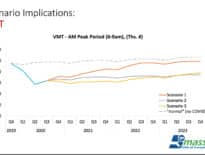In its first full quarter since merging with Wellesley Bank, Cambridge Trust Co. saw third quarter earnings increase 74.9 percent compared to the same quarter last year.
Cambridge Trust had net income of nearly $13.43 million for the quarter ending Sept. 30 compared to net income of about $7.67 million for the same quarter in 2019. Diluted earnings per share were $1.93 for the third quarter, a 22.9 percent increase over diluted earnings per share of $1.57 in the third quarter last year.
While net income year-to-date through Sept. 30 was $18.94 million, a 4.4 percent increase compared to the same time period last year, diluted earnings per share of $3.09 were down 21.8 percent year-to-date compared to last year, when diluted earnings per share were $3.95. The bank had a net loss during the second quarter.
Cambridge Trust, which completed its acquisition with Wellesley Bank on June 1, said in its earnings statement that the year-to-date results were affected by the merger’s impact on the current expected credit loss accounting standard within the provision for credit losses, merger expenses, and other non-operating items.
The third quarter provision for credit losses was $2 million, which the bank in its earnings statement attributed to changes in assumptions associated with the pandemic. Year-to-date through Sept. 30, Cambridge Trust had a total provision for credit losses of $18.4 million, including $9.3 million associated with the pandemic’s expected impact on future loan losses and $8.6 million for the non-operating impact of the merger related CECL.
The merger was a key factor in a 34.9 percent increase in noninterest expenses, from 18.9 million in the third quarter of 2019 to $25.4 million for the third quarter of 2020. Salaries and employee benefits increased by 30.5 percent, including increased staffing related to the merger. Occupancy and equipment expenses increased by 31.7 percent, primarily because of additional banking locations and office space from the merger with Wellesley and also the 2019 merger with Optima Bank & Trust in New Hampshire. Merger expenses were $1.2 million, including a one-time non-operating cost related to the Wellesley merger.
The merger was also a factor in Cambridge Trust’s growing wealth management business. Wealth management revenue increased by 14 percent to $8 million for the third quarter of 2020, compared to $7 million for the third quarter of 2019. Cambridge Trust now has $3.9 billion in wealth assets under management and administration, an increase of $495.6 million, or 14.4 percent, from Dec. 31, 2019. The bank attributed the growth to the merger as well as the appreciation in equity markets this year.




 |
| 




